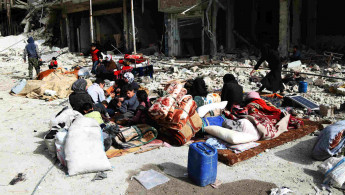Displaced Syrians can return to Eastern Ghouta 'soon': Russian official
A Russian official said that displaced Syrians, some 178,000 who have left Eastern Ghouta, can begin returning to the Damascus suburb on Sunday.
2 min read
Syrians waiting to be evacuated from Eastern Ghouta [Getty]
Russian Defence Minister Sergei Shoigu said on Thursday that Syrians displaced by the regime's Eastern Ghouta offensive could begin returning to the area on Sunday or Monday.
Russian officials also said the military offensive is "nearly over," with rebels abandoning all of the towns in Eastern Ghouta except Douma.
The regime on Thursday gave Jaish al-Islam, which controls Douma, the largest town in Eastern Ghouta, a final, three-day ultimatum to evacuate or face a military assault.
The rebel group has vowed to stay in Douma after talks brokered by Russia faltered.
Later on Thursday, the Syrian Observatory for Human Rights monitoring group said that the first convoy of the sixth batch of evacuees left Eastern Ghouta. About 60 buses reportedly carried 3,000 people, including 1,000 fighters, out of the area.
The number of people that have left Eastern Ghouta has now topped 178,000. The area had been home to 400,000 people before the Syrian regime, with Russian backing, began its offensive on February 18.
Tens of thousands of civilians have stayed behind to accept regime rule.
Meanwhile, the UN humanitarian coordinator's office in Syria said on Thursday that 75,000 civilians had been received in shelters and 47,000 are still there. The UN office described the conditions in the makeshift shelters as "dire".
The total capture of Eastern Ghouta would mark the biggest defeat for rebels since the fall of Eastern Aleppo in 2016. Until last month, the enclave was the biggest and most populous rebel-held area near Damascus.
Assad and his allies say their offensive was needed to stop rebels from lobbing missiles into nearby Damascus, which Syrian state TV says has killed dozens in recent weeks.
According to the Syrian Observatory, more than 1,600 people have been killed and 6,000 wounded since the regime offensive began last month.
Russian officials also said the military offensive is "nearly over," with rebels abandoning all of the towns in Eastern Ghouta except Douma.
The regime on Thursday gave Jaish al-Islam, which controls Douma, the largest town in Eastern Ghouta, a final, three-day ultimatum to evacuate or face a military assault.
The rebel group has vowed to stay in Douma after talks brokered by Russia faltered.
Later on Thursday, the Syrian Observatory for Human Rights monitoring group said that the first convoy of the sixth batch of evacuees left Eastern Ghouta. About 60 buses reportedly carried 3,000 people, including 1,000 fighters, out of the area.
The number of people that have left Eastern Ghouta has now topped 178,000. The area had been home to 400,000 people before the Syrian regime, with Russian backing, began its offensive on February 18.
Tens of thousands of civilians have stayed behind to accept regime rule.
Meanwhile, the UN humanitarian coordinator's office in Syria said on Thursday that 75,000 civilians had been received in shelters and 47,000 are still there. The UN office described the conditions in the makeshift shelters as "dire".
The total capture of Eastern Ghouta would mark the biggest defeat for rebels since the fall of Eastern Aleppo in 2016. Until last month, the enclave was the biggest and most populous rebel-held area near Damascus.
Assad and his allies say their offensive was needed to stop rebels from lobbing missiles into nearby Damascus, which Syrian state TV says has killed dozens in recent weeks.
According to the Syrian Observatory, more than 1,600 people have been killed and 6,000 wounded since the regime offensive began last month.
The Syrian conflict began when the Baath regime, in power since 1963 and led by President Bashar al-Assad, responded with military force to peaceful protests demanding democratic reforms during the Arab Spring wave of uprisings, triggering an armed rebellion fueled by mass defections from the Syrian army.
The brutal tactics pursued mainly by the regime, which have included the use of chemical weapons, sieges, mass executions and torture against civilians have led to war crimes investigations.
Follow us on Twitter: @The_NewArab




 Follow the Middle East's top stories in English at The New Arab on Google News
Follow the Middle East's top stories in English at The New Arab on Google News
![The UAE is widely suspected of arming the RSF militia [Getty]](/sites/default/files/styles/image_330x185/public/2024-11/GettyImages-472529908.jpg?h=69f2b9d0&itok=Yauw3YTG)
![Netanyahu furiously denounced the ICC [Getty]](/sites/default/files/styles/image_330x185/public/2024-11/GettyImages-2169352575.jpg?h=199d8c1f&itok=-vRiruf5)
![Both Hamas and the Palestinian Authority welcomed the ICC arrest warrants [Getty]](/sites/default/files/styles/image_330x185/public/2024-11/GettyImages-2178351173.jpg?h=199d8c1f&itok=TV858iVg)